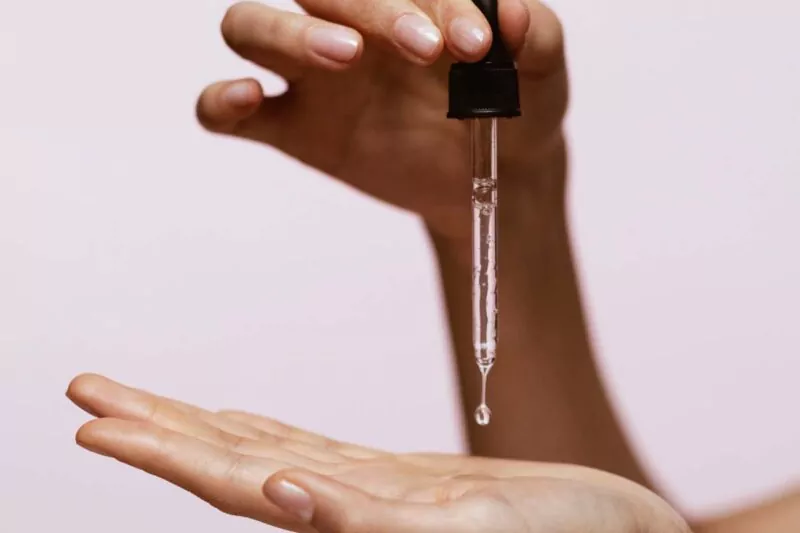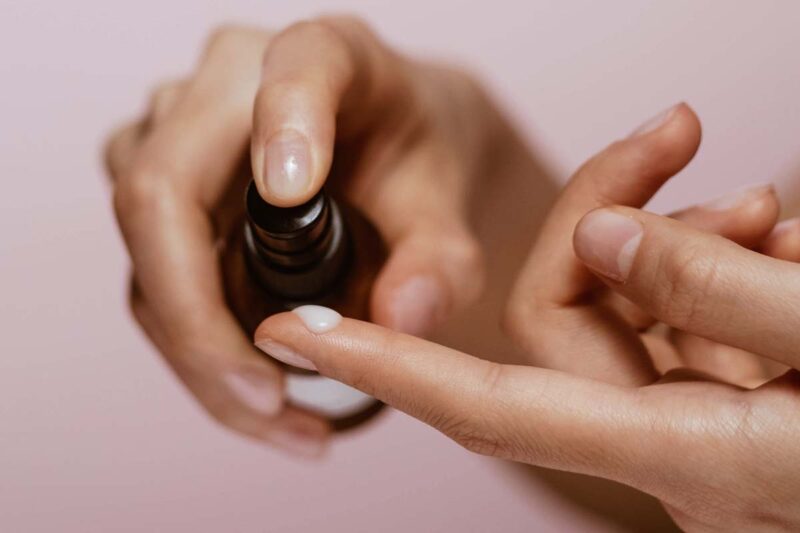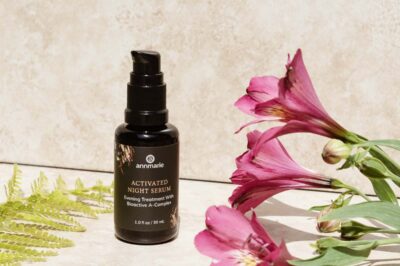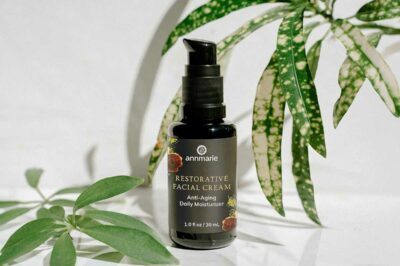Table of Contents[Hide][Show]
If you’re familiar with the world of skin care, we’re sure you have come across a few terms that often cause confusion: retinol-alternatives, retinol, and retinoids. These ingredients are commonly used for their ability to improve the appearance of skin texture and make it look smoother and more even-toned.
Today, we’ll delve into the difference between retinol-alternatives, retinol, and retinoid, what these terms mean, and why they may (or may not) be a consideration in your natural skin care routine.
What Is A Retinol-Alternative?
Retinol-alternatives have gained popularity for those seeking effective skin care solutions without the potential irritation and harmful effects associated with traditional retinol. One such alternative is bakuchiol, a plant-derived compound known for its anti-aging benefits, which mimics the effects of retinol but is gentler on the skin.
However, the latest breakthrough in this field is green algae-derived Bioactive A-Complex. This innovative ingredient stands out for its ability to deliver similar rejuvenating and skin-firming effects as retinol, but for its non-toxic nature with enhanced skin tolerance and additional hydrating properties.
The Bioactive A-Complex not only supports skin’s natural renewal processes but also provides a sustainable and skin-friendly option, making it an excellent choice for those seeking a high-performance, non-irritating anti-aging alternative.
What Is Retinol?
Retinol is a type of retinoid, a class of compounds derived from vitamin A. Retinol is commonly included in anti-aging skin care products aimed at enhancing your skin’s look. It works by encouraging the skin’s surface renewal process, contributing to the appearance of a more vibrant, youthful complexion.
However, despite the benefits that come with retinol, it’s an ingredient that can have detrimental effects in the long run. Its concerns range from those that involve your skin, like thinning skin to increased sun sensitivity, to those that impact your health, like reproductive and developmental issues.
You’ll often hear that retinol is not safe to use during pregnancy or breastfeeding, and for good reason. And though it is recognized for being less potent than its prescription counterparts (often used by individuals new to vitamin A derivatives or those with sensitive skin), it doesn’t necessarily mean it is less harsh or safer to use.
What Is Retinoid?
Retinoids represent a broader family of vitamin A derivatives, encompassing various compounds known for their potential to interact with the skin’s natural processes. These compounds range from mild over-the-counter options to stronger, prescription-only formulas. Retinoids are used in skin care for their varied properties, addressing concerns such as the appearance of aging, texture, and overall skin tone.
Retinoids do come with different types, each with its own level of strength and efficacy. These include retinol (a specific type of retinoid), retinaldehyde, and prescription-strength forms like tretinoin and isotretinoin. The more potent forms, typically available through dermatological guidance, are used to target specific skin concerns under professional guidance, often used in more targeted skin care therapies.
What Is The Difference Between Retinol-Alternatives, Retinol, and Retinoid?

Different Forms of Vitamin A or Activated Ingredients
Retinol and retinoids are both forms of vitamin A, yet they exist at different points in the vitamin A conversion pathway. Retinol is a specific type of retinoid, considered a milder variant and typically used in over-the-counter skin care products. It must be converted into retinoic acid by the skin at the cellular level to be effective, a process that can reduce its potency but also makes it more tolerable for sensitive skin types.
On the other hand, other retinoids, such as tretinoin (also known as Retin-A) and isotretinoin, are direct derivatives of vitamin A and are more potent. These forms act more quickly and effectively due to their closer chemical composition to retinoic acid, which is the active form of vitamin A recognized by skin cells.
Then, there’s Bioactive A-Complex, which is algae-powered. This sustainable, non-toxic ingredient engages with the skin through a synergistic approach to deliver remarkable benefits. It activates specific receptors on skin cells, much like retinol, encouraging them to ramp up skin firming, which are vital for the look of youthful bounce and skin elasticity. Additionally, this complex is rich in antioxidants, which shield the skin from environmental stressors, thereby preventing premature aging. Unlike retinol, which may cause dryness and irritation, Bioactive A-Complex enhances skin hydration by strengthening the skin barrier, ensuring the skin remains plump and resilient.
It also offers gentle exfoliation, resurfacing the skin to reveal a smoother, brighter complexion. And lastly, even though it’s incredibly potent in effectiveness, it is suitable for even sensitive skin types. This holistic approach makes the Bioactive A-Complex a superior, non-irritating alternative to traditional retinols.
Strength and Timeframe
The main differences between retinol and stronger retinoids lie in their strength and how quickly they impact the skin. Retinol is milder and works more gradually, making it a more adoptable option for those with sensitive skin or those new to vitamin A.
Conversely, prescription retinoids have a more immediate effect due to their higher potency. While they can be used under dermatological guidance due to their stronger formulations, they also have a higher likelihood of causing side effects such as dryness, redness, and peeling, particularly during the initial period of use.Bioactive A-Complex is featured in two of our MADE SAFE® products—Revitalize Concentrated Boosting Elixir and Activated Night Serum. Though this ingredient brings about skin benefits in a safer way, its effectiveness is not to be overlooked. When green algae are grown under conditions of high UV exposure, they ramp up their chloroplast production.
After these cells are disrupted, the chloroplasts are concentrated using a gradient method, and the lipid fractions isolated from these chloroplasts offer numerous skin benefits such as renewal, hydration, and anti-aging properties. The Bioactive A-Complex derived from these lipids has been shown to effectively combat signs of aging, enhancing the skin’s vibrancy and health. It has been shown to accelerate skin turnover by 20%, promoting quicker skin renewal. Immediate and long-term studies reveal that Bioactive A-Complex increases hydration and improves the skin’s texture and firmness from the first use, with sustained improvements over four weeks, including enhanced clarity and overall appearance.
Usage and Accessibility
While retinol-alternatives and retinol are widely accessible online or in over-the-counter skin care products, the various other types of retinoids, particularly the stronger ones, might require a consultation with a healthcare provider.
This distinction is important for those who prefer to incorporate natural and organic elements into their skin care regimen, as it influences the type of products they might choose and how they integrate them into their routines.
Retinol-alternative’s availability and its compatibility with a range of skin types make it a favored option for those exploring natural retinol or retinoid alternatives. Meanwhile, those opting for stronger approaches, such as retinol or even retinoids, should consider their skin’s sensitivity and potential reactions both in the short-term and long-term, aligning their choices with a holistic view of health and wellness.
Choosing Between Retinoid and Retinol or Retinol-Alternatives

When it comes to incorporating retinol-alternatives or vitamin A derivatives into your skin care routine, making an informed decision between these three options is crucial. This decision should be reflective of your individual skin concerns, type, overall wellness objectives, and professional advice.
Assessing Skin Concerns and Skin Type
Before deciding on which one to choose, you need a thorough assessment of your skin concerns and type. Are you looking to address the appearance of fine lines, uneven skin texture, or perhaps the overall vibrancy of your skin? We are cautious of the effects of retinol and prefer retinol-alternatives that are safer for use and are best suited for those who want to revitalize their skin’s appearance without the nasty side effects traditional retinoids carry. Alternatives are especially recommended for those who value non-toxic, natural skin care.
For more immediate effects on pronounced skin concerns, we understand a traditional retinol or retinoid may sound enticing; however, these stronger forms do come with a slew of potential risks that should also be taken into consideration. Understanding your skin type—whether dry, oily, combination, or sensitive—may be helpful when starting off with vitamin A, in that if your skin tends to be more resilient, it may tolerate retinol or retinoids better than someone with a more sensitive skin type. However, regardless of the skin type you have, continued exposure can result in long-term negative impact simply due to the nature of retinoids. We prefer to steer clear and use safer alternatives.
Considering Skin Sensitivity
Skin sensitivity is an important factor when deciding between retinol-alternatives, retinol, and retinoids. If your skin is sensitive, prone to redness, or reactive, starting with a lower concentration of retinol-alternatives and utilizing those infused with natural, soothing ingredients can be a wise approach. For example, you can start by mixing just one drop of the Revitalize Concentrated Boosting Elixir with your preferred facial serum or facial oil once or twice a week to start. Then, add up to 2-3 drops if your skin responds well.
Conversely, if your skin is more resilient and accustomed to activated ingredients, using a retinol-alternative at a slightly higher concentration or more regularly may be suitable. Always listen to your skin’s responses and adapt your skin care practices accordingly, maintaining a focus on gentle care.
Additionally, with any type of retinol product (including retinol-alternatives), because these activated ingredients have a resurfacing effect on the skin, it is important that you follow up with a high-quality sunscreen the following morning. Ideally, limit sun exposure (especially if using traditional retinols or retinoids). But even with safer retinol-alternatives, you’ll want to give some time to the skin renewal process and offer proper protection.
Expectations for Results
Set realistic expectations for the results and the timeframe in which you hope to see changes. If using vitamin A, retinol, being gentler than prescription-grade options, typically requires a longer period of consistent use to observe visible changes.
If your expectations include more immediate results for more significant skin concerns, a retinoid may provide that, though it’s essential to balance these expectations with the potential for increased skin sensitivity and other risks.
Or, if using one of our products with Bioactive A-Complex, we usually recommend observing the changes in your skin over a typical skin cycle of 30-45 days with consistent use (at a rate that is well tolerated by your skin type).
Personalized Skin Care Plans
Finally, including retinol-alternatives, retinol, or retinoids into your skin care routine should be part of a personalized skin care plan that reflects your preference for overall lifestyle, wellness goals, and commitment to natural beauty. As we’ve covered above, if your priorities rely heavily on using safer skin care, a retinol-alternative takes the cake. You’ll also want to consider other factors such as your current skin care products, daily routines, and environmental exposures.
A personalized plan might start with a retinol-alternative to gauge your skin’s tolerance and progressively incorporate other types of safe, but potent activated ingredients as needed, always prioritizing skin health and natural integrity.
Conclusion
While all three options offer paths to improve skin appearance, their suitability depends on individual skin type, concerns, and sensitivity, as well as personal preferences towards natural skin care.
By understanding the nuances between retinol-alternatives, retinol, and retinoids, you can make informed decisions that best suit your journey towards healthy, radiant skin.
And with revolutionary alternatives now available on the market that offer the same skin rejuvenation as traditional retinols—but without the harsh side effects, we are big fans of incorporating safer retinol-alternatives into skin care regimens and saying “no” completely to conventional versions that can hurt skin and health in the long run. We’re thrilled to be able to share safer choices with our audience because we understand that knowing exactly what you are putting on your body is as important to you as it is to us.
Frequently Asked Questions
Can You Use Retinol and Retinoid Together?
It’s generally not advisable to use retinol and retinoids together due to the increased risk of skin issues, like reactivity, thinning skin, and sensitivity. You should always consult with a skin care professional to tailor a routine that’s right for your skin type and concerns.
Should I Start with Retinol or Retinoid?
Choosing between starting with retinol or a retinoid depends on individual skin concerns, sensitivity, and experience with skin care activated ingredients. Retinol is typically recommended for beginners due to its milder nature compared to prescription-strength retinoids, making it a common starting point for those looking to gradually introduce vitamin A derivatives into their regimen.
However, we prefer to use Bioactive A-Complex, a safe alternative to retinol, instead. This ingredient delivers similar results to retinol, but without the harsh side effects and long-term negative health impacts.
How Long Does It Take to See Results from Retinol or Retinoids?
The timeframe can vary based on the product’s strength and your skin type. Generally, retinol-alternatives and retinoids show gradual results when compared to retinoids, often visible after several weeks to months of consistent use.
Are Natural Retinol Sources Effective?
Natural sources of retinol can be effective in overall skin health, however, these forms are typically consumed as foods. Topically-applied vitamin A is usually synthesized for skin care, and in this version can cause potential risks to skin and health. For a nature-powered product that provides the same benefits as retinol, consider incorporating Bioactive A-Complex—a safe retinol-alternative.
Should I Consult a Dermatologist Before Using Retinoids?
If you are looking to incorporate stronger retinoids, consulting a dermatologist or skin care professional is advisable, especially to address specific skin concerns and to ensure the product aligns with your skin type and health. It may also be necessary to consult with a professional, as these more concentrated products may require a prescription.








Leave a Reply